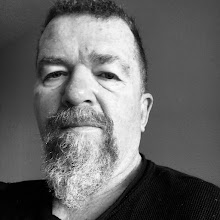 I
It was the late 1960s, a warm summer's night, we (myself, two brothers, Dad and Harry, our step-sister's husband) had just left the dirt-track super-modified races, at the old track that's now long gone, but was once located on Eubank south of Central Avenue, in Albuquerque, and we headed up east Central, the old Route 66, toward the Western Skies hotel and night club, once a notable landmark and venue that hosted many stars and musicians in its day. Glenn Campbell, for instance, had his start, with his uncle Dick Bills, at the Western Skies, years earlier.
Interstate 40 had just been completed at this time, offering an alternative route through town that bypassed Route 66, which had already begun its long, slow economic demise.
 W
We stopped at the Western Skies but didn't go in, instead lamenting its already notable decline from its glory years in the 1950s, the parking lot near empty. Harry turned around the convertible Plymouth Roadrunner and, with a twinkle in his eye, asked us if we'd ever been over 100 miles per hour.
We hadn't, of course. I was probably all of ten years old, if that.
And so, with a nod of Dad's approval, Harry mashed the throttle and that big Mopar hemi engine roared to life. The cool night air suddenly grew to hurricane strength, our eyes squinting in the gale, and flashing neon motel signs blurred by, dream-like. It lasted for all but a few seconds, before Harry had to slow down for the light at Eubank, but we'd had our once-in-a-lifetime thrill, on the Mother Road.
 I
In the intervening years, it seems as if those brightly-lit neon signs of a bygone era have raced passed our culture's notice in a blur every bit as reminiscent of that late-night joyride from long ago, a slow-motion journey of sadness whose signposts are marked by evidence of political shortsightedness, greed and the inevitable consequences of economic change. Things grow, things change, things die; that's life.
I've written before, within these pages, of Route 66's history and heritage in Albuquerque, and some direct connections to my family's story, upon which we will not linger further. Yet there remains this fact: history is constantly being written anew. Today is tomorrow's past, what happens right this second is history to some future perspective.
 A
And so, it is with these thoughts in mind that I rode my motorcycle down Central Avenue this morning, in the bright, clear morning light that's so photogenic, armed with Fuji Instax 210 camera to record, on my way to breakfast, some fleeting glimpses of the remnants from a former era.
 I
I've put together this little kit for the Fuji camera. The camera, it's an ungainly looking contraption, over-sized, rounded corners, like some radiation-enhanced plastic toy. I carry it in an army-green canvas messenger bag, along with a spare pack of film (it's about 80 cents per shot if purchased in batches of 100 via the Global Interconnected Data Network), along with a thin, flexible plastic file card storage box, just big enough to hold the 16:9 wide-screen prints. The camera, it spews out the exposed film from a slot in the top. I immediately stow the still-developing print inside the little box to protect the film from fingerprints, dirt and sunlight, which permits a bit more color saturation to the finished image.
 I
I found the best way to carry the camera from the motorcycle to pursue a picture was sans messenger bag, with the film storage box in my other hand. Click, whirr, then grab the print by the corner with my mouth as it's spewed from the top slot, letting the camera dangle on its wrist strap while I quickly slip the print into the little storage box.
 A
And so, I sit here in Winning Coffee at the long, wooden table (my usual haunt), while across the room Bradley is setting up his mobile bookstore at the counter by the coffee roaster, and my blue plastic storage box on the table next to my notebook, it's carrying a load of about a dozen images so far, of my ventures out and about this morning.
 B
Breakfast done, I headed east on Central, into the brightness, sunglasses donned. There's an area just east of Nob Hill that's laced with numerous antique and thrift shops, some just indoor flea markets, others sporting fancier fare that's well out of my price range. I ventured into one of the mid-range places, not high-end but neither flea market discards. I came away with an aluminum clipboard and antique turquoise-colored desk fan (which I picked up later, in my car). What I didn't purchase were several manual typewriters (a Smith Corona and a portable of German make), mainly due to their condition; neither did I walk away with a WWI-era, French-made binocular, nor one of several French plate cameras from the 19th century (which sorely vexed me, the temptation being to recondition or replace the bellows and use them for studio work with paper negatives). My office, we've just managed to complete its remodel and it doesn't need the continual accumulation of More Stuff.
 S
Such is life, the continual accumulation of its artifacts, both physical and cerebral. The memories, I take pleasure in collecting them, photograph-like, as they are the raw stuff of stories, legends and lore yet to be, as I ride into the sunlight on the Mother Road, through the geography of my past, into an expectant future.
(Penned in composition book, images via Fuji Instax Wide 210 instant film camera)

0 Comments:
Post a Comment
<< Home